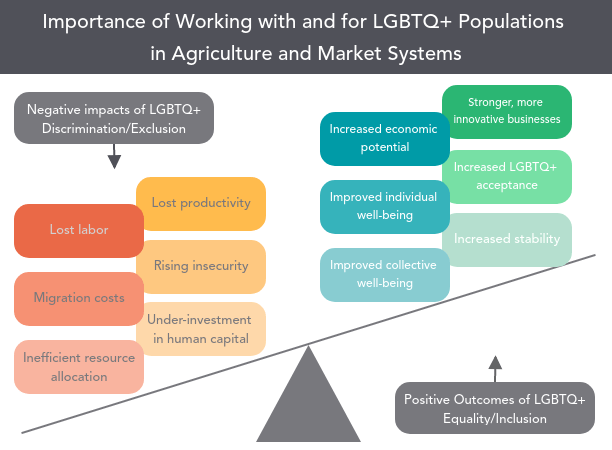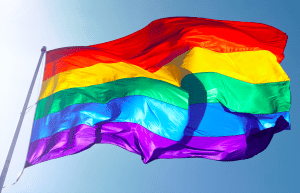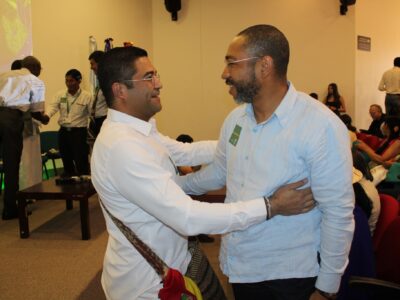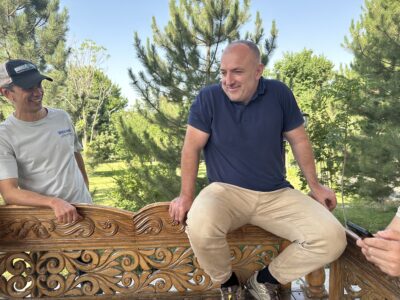
This June marks Pride Month, a celebration of the advancement of Lesbian, Gay, Bisexual, Transgender, and Queer (LGBTQ+) rights and opportunities. At ACDI/VOCA, we are proud to celebrate Pride and equality for people of all gender identities and sexual orientations. Though there is still much work to be done, we aim to support the greater inclusion of LGBTQ+ populations through agriculture and market systems development (MSD) programs that we implement around the world. As vice president of gender and social inclusion at ACDI/VOCA, I reflect this month on the economic and social benefits of including LGBTQ+ groups and their impact on global development.
What are the economic costs of excluding LGBTQ+ populations from agriculture and other sectors?
There are many negative impacts of LGBTQ+ discrimination and exclusion. Stigma, lost earning potential, harassment, violence, and homelessness have more than just negative psychological and social impacts. There are also economic costs that impact individuals and households as well as markets and country-level economies. A 2014 study conducted by the World Bank observed that discrimination against LGBTQ+ people in India could be costing that country’s economy up to $32 billion a year in lost economic output. Meanwhile, a 2019 study conducted by the Williams Institute at the University of California, Los Angeles (UCLA), found that LGBTQ+ stigma and discrimination in South Africa resulted in economic costs of approximately $317 million due to wage discrimination and underemployment, between $3 and $19.5 billion due to disproportionate health disparities, and between $10 and $65 million due to disproportionate experiences of sexual violence.

ACDI/VOCA’s research in Honduras found that LGBTQ+ youth leave rural areas at higher rates because of rejection by their families and communities. These youth move toward cities and urban areas, and this lack of “staying power” has economic costs to rural communities, especially rural agrarian communities that are already facing labor shortages caused by outmigration and a lack of youth interest in agriculture.
What are the benefits of greater inclusion of LGBTQ+ populations?
Many positive outcomes can be realized through including LGBTQ+ populations and enabling them to achieve their economic and social potential. Ensuring equitable access to education and training improves productivity, particularly if LGBTQ+ individuals are treated equally in the labor market. When individuals can be who they are and do what they value, their well-being improves.
Studies have overwhelmingly shown that businesses benefit from greater diversity, which leads to innovation, positive brand reputation, expansion into new market segments, and other positive outcomes. A diversity of market actors performing different functions in the market system is also a recognized attribute of resilient market systems that are capable of responding and adapting to shocks and stressors, as described by USAID’s Market Systems Resilience Framework. Promoting the rights and freedoms of LGBTQ+ individuals is important not only because ACDI/VOCA believes that all people should have the opportunity to achieve better lives for themselves, their families, and their communities, but also because inclusive economies are stronger, more productive, and more resilient.
According to a 2014 study by USAID and the Williams Institute at UCLA, countries that come closer to full LGBTQ+ equality have higher levels of GDP and other measures of economic performance, such as capital stock and international trade. This study reviewed data for 39 countries over a period of 22 years and found that countries with more LGBTQ+ rights had higher levels of well-being, including educational attainment and life expectancy. Countries with at least one of eight rights encompassed in the Global Index on Legal Recognition of Homosexual Orientation were associated with $1,400 more in per capita GDP. The addition of a right adds approximately $320 per capita, or about 3 percent of the average output produced by an economy.
What are the unique challenges of working with LGBTQ+ populations in agriculture and MSD programming?

ACDI/VOCA’s inclusive market systems approach helps vulnerable populations engage in their local market and food system as buyers, sellers, employers, and consumers who come together to trade goods and services, improving lives and livelihoods for all. For implementers of agriculture and MSD programs, collecting data about LGBTQ+ populations in these contexts can be a challenge, as there is a global data gap about LGBTQ+ participation, barriers, opportunities, risks, and needs in rural value chains, supply chains, and supporting systems. There is also a broad gap in data regarding LGBTQ+ workforce-related needs as well as employer and institutional attitudes, perceptions, and challenges to employing members of this group that also advances their bottom line. All countries have their own unique contexts, and without first collecting this data, it is very hard to make informed programing decisions on inclusion strategies for LGBTQ+.
Program implementers often lack the appropriate tools and processes to collect this data, and — because LGBTQ+ inclusion has not previously been recognized as a key approach — they often lack the funding, staff, and networks or partnerships needed to develop such tools and processes.
So, where should we begin to approach LGBTQ+ inclusion in these areas?
Check out the full 2021 Pride Month blog series:
- Why the Inclusion of LGBTQ+ Populations in Agriculture and Market Systems Matters, Part 2
- Q&A: Experts Discuss Challenges and Opportunities for Collecting LGBTQ+ Data
- Pride Month Blog Series: Experts Discuss Opportunities for Expanding LGBTQ+ Inclusion in Agriculture and Market Systems Development






